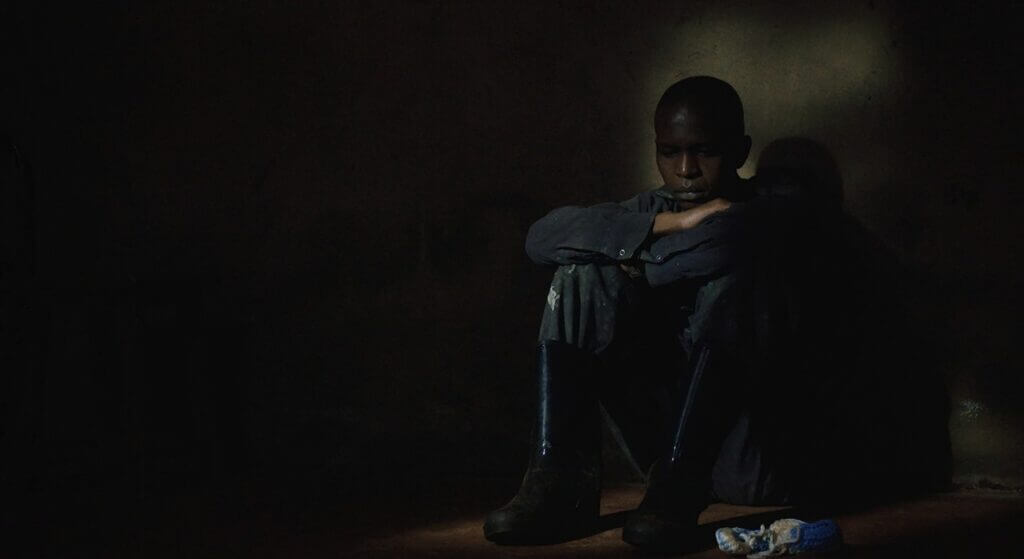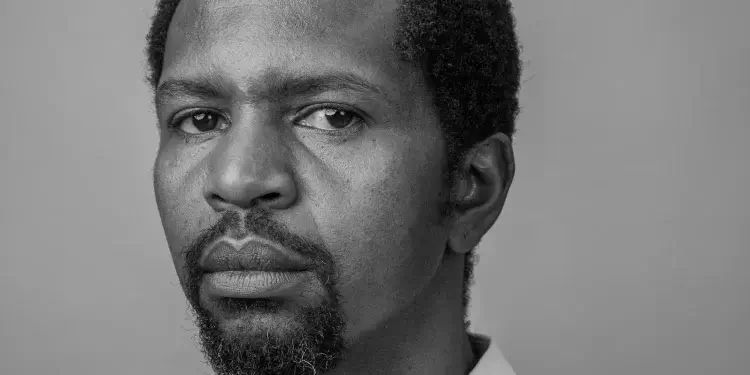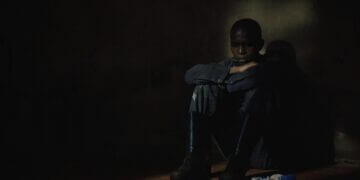The venue is Alliance Française, at the official Kenyan premiere of the long-awaited, internationally acclaimed feature Shimoni. The man of the hour is none other than Justin Mirichii, the film’s lead character. He has been a working actor since 2008, and has featured in projects such as Watu Wote: All of Us (2016), Rafiki (2018), Disconnect (2018), and Little Black Dress (2019).
He walks into an electrified audience, confidently dressed in an elegant grey suit, for a panel discussion with the rest of the key cast right after the screening of the film. He has a calmness to him. He’s also very calculative and deliberate with his words while graciously giving and receiving praise. And it’s no surprise that as Shimoni’s lead Geoffrey, he gave one of the most outstanding performances an actor has ever delivered in the Kenyan film landscape.
Despite a career spanning more than a decade, Shimoni is Mirichii’s first leading feature role, which evidently opened him up to a completely new experience. “Every job is different; different story, writer, director, even the crew and cast members around you. However, for Shimoni, the depth of the story is what I can really call the grand difference from any other project I’ve done before. The intentionality of the directing as well, and basically being a main role for me and the demand to be on set every day for every scene was a first,” Mirichii reveals.
This shift from the norm is what most actors would term as ‘demanding roles’. The roles that make one play outside the box and away from their typecast. The roles that prove and test the acting capability and growth, ultimately, truly set apart the real working actors from the rest. For Mirichii, this was truly one of those roles.
“I celebrate each role for its own cognizance because someone sat down to put it together, but the thing about Shimoni was that it was less demanding in terms of lines, with few spoken parts for my character Geoffrey, whereas generally as an actor you feel like the more lines you have, the bigger the role,” Mirichii says. “For Shimoni, I had to ‘speak’ without saying anything, and for such roles, you have to go there mentally and have internal dialogue otherwise it is going to be very bland. This was the most demanding role I have ever done and it brilliantly worked for me because it stretched me, and now I know how much further I can go. I have been acting for 15 years, but now…I’m finally an actor.”
An actor-director relationship pretty much sets the tone of the entire project, the crucial process of laying down the foundation and understanding each other’s rhythm in order to bring out the creative vision to life takes time. In the case of Shimoni, with two months of pre-production rehearsals, both Mirichii and the director Angela Wamai had one-on-one conversations about personal experiences, and about vulnerability.
“The thing I really appreciate about Angela is, because this story was very sensitive, she was sensitive in her own space as the director. She was open to listening to ideas, and very kind in the manner she approached me. She gave me freedom to ask questions especially for a role as heavy as Geoffrey was. I don’t think many directors are equipped to have tough conversations or are even open to stupid questions. For instance, I’d ask ‘Does this character start walking with his right foot or left foot?’ And then we’d end up talking about his life experiences and what he (Geoffrey) puts forward, the right foot being symbolic of something and vice versa.”
Mirichii’s preparation for the role took on a whole new level as he transformed both physically and mentally. He had to lose weight and fully tap into his vulnerability to bring out Geoffrey’s depth and truly relate to him.
“At some point, I think we all (or for most people) feel alone, or frustrated, depressed or even feel that the thing we are doing is not working. I lent those feelings to Geoffrey,” Mirichii explains. “We have moments in life where we feel like an outsider, and there is loneliness. For Geoffrey, this is all happening on a grand scale. He has no one to share his feelings, memories or even nightmares with. He is not heard, and neither does he have the words to speak. If you put all this through your mind, you already start to get a small sense of who this character is, of how he feels when he wakes up in the morning and faces life.”

This then brings up the question of how an actor de-roles from such a heavy character as Geoffrey and resumes their real life identity. It’s in the clear separation of the actor from the character, Mirichii says. “Sometimes it (de-roling) does seem like a very complex thing, which it is, but it’s also simple in the way that it is where you place your focus. If I place my focus on my life as Justin, that is where my senses go, that’s who I am in that moment, but if my focus is on Geoffrey, mentally and emotionally, then I go to that side of things,” Mirichii explains, adding, “If you can understand there is a division, that you do not become the character, you are living in their space. Your subconscious tethers you to the reality of life that when you momentarily embody Geoffrey consciously, your subconscious mind draws you back to your family life. That is why when playing Geoffrey, I had to be away from my family, my wife and my newborn son who was barely two weeks old.”
Shimoni is a film that dares to challenge the status quo and brazenly raise the question: what are the socially acceptable and unacceptable wrongs? This is depicted by Geoffrey’s plight, an ex-con who served his time for a heinous crime, but received no justice himself for an equal heinous crime that was done to him.
With such a societal fault in that, most of the time, the punishment never matches the crime, the buck starts and stops with the criminal justice system in Kenya where prison reforms are inadequate in actively supporting reintegration of criminals back into society.
“We have failed at correcting the sentences people serve, like for Geoffrey, even beyond his jail term, he is still serving another sentence with not so many people willing to give him a second chance to re-create or reinvent himself,” Mirichii says.
Shimoni is a poignant film, and a “very uncomfortable film” as Mirichii describes it. The film’s resounding theme is how men, even those who are hurting, are expected to endure their pain in silence. Even more so with terms like toxic masculinity gaining prominence and mental health taking a back burner. “Men across the world have problems with being vulnerable with their feelings; however, in the African setting, there is more pressure for a man to fit into society,” Mirichii says. “What we need is more individualism, to be ready to say what I am going through and to have a support system that listens to me. If there is no room to be heard, why should I speak about it?”
With the international praise it has received during its festival run, Shimoni should easily be Kenya’s official submission to the 2024 Oscars but that remains to be seen as we’ve had some questionable entries in the past. For local awards like the Kalashas who have received backlash over the years for its awarding criteria, will Shimoni get its due?
Mirichii weighs in. “You know what, this work is so much more important than any other award, and especially, sorry to say, local awards that are not critically awarded. These are the same awards that depend on an audience that may not have insight on what it takes to produce a film like this, awards that depend on voting without regarding how wide a film’s distribution and reception has been, having people that cannot really artistically acknowledge and give credit where its due. Even with all this, failing to understand that different genres bring different expectations is a major issue we need to figure out with our award system.”
Read: Kenya at the Oscars and Why We Must Put More Thought Into Our Submissions
Enjoyed this article?
To receive the latest updates from Sinema Focus directly to your inbox, subscribe now.











